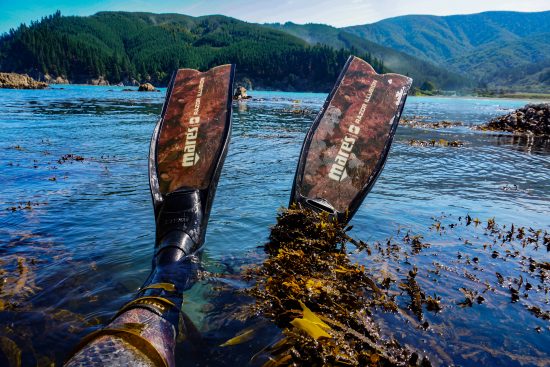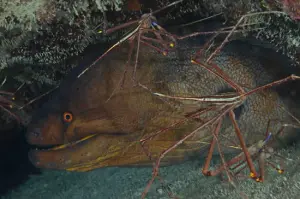
Located at the north eastern point of the South Island and making up 150km or ⅕ of New Zealand’s coastline, the Marlborough Sounds are a network of drowned valleys. Including Queen Charlotte, Kenepuru, Pelorus, and Mahau, they cover 4000km2 and are made up of isolated coastline, steep forest hills, sheltered inlets and sandy bays. The Marlborough Sounds are brilliant diving all year round, with water temperatures ranging from 10 degrees in the winter to a warm 18 in the summer.
The sounds offer something to interest every diver, from deep technical wrecks like the Lermontov, to shallow wrecks and friendly blue cod. As a bonus, the winding waterways make for incredibly scenic boat rides with whales, seabirds and dolphins to be spotted along the way. Having never dived the south island, I found some cheap flights and booked a few days diving in the Marlborough Sounds. Known better for its wine and great walks, I wanted to see what diving was on offer.
Flying into Blenheim, you can see the fantastic diving potential from the air. Kilometres of ocean, a mixture of inky blue and green water and steep hills greet you as you fly over the breathtaking Marlborough Sounds. After a short plane flight, I was off to Picton to meet my dive guides for the week. For this trip, I was heading out with Stu, Katie and Kate from Waikawa Dive Centre. Having operated in the sounds for a number of years, they were tasked with showing me the best of the area. An SSI Centre, they offer a full range of rental gear, a variety of dive courses and of-course they will show you the best dive sites in the sounds.
After a brief rundown on where we would be diving and checking the usual, unfavorable weather forecast (that seems to follow me on my dive adventures), a plan was hatched to fit in as much diving as possible.
Dive Sites
For a quick taste of diving in the Marlborough Sounds, you can’t go past the inner sounds. Shallow, often clear and slightly warmer, the inner sounds are an excellent choice for beginners and experts alike. The locations dived here are all just a short boat ride from the marina, meaning plenty of time under the water. As a bonus, diving the inner sounds allows you to take in the stunning above-water scenery, the beautiful bird sound and spectacular wildlife including little blue penguins, shags, Hector’s dolphins and seals. Fish life in the inner sounds varies, but you can expect to see sweep, spotty, yellow-eyed mullet, goat fish and the main attraction, the comical looking blue cod. Usually very friendly, they are not afraid of divers, and make for great company on your dives.
If you’re up for a bit more of an adventurous dive, then diving the Tory Channel can be an exhilarating experience. Due to the strong currents found in the channel, this dive is not one for the novices, however for confident divers looking for a thrill, it’s great fun whipping along in the current past large crayfish, and a variety of fish.
Long Island is the sounds only official marine reserve and a great option should the weather turn unpleasant. Protected by the predominant southerly wind, it is a great dive in almost all conditions, and with a depth of only 10 to 15 meters, it is a great spot for beginner divers. One of the sites here is known as Jurassic Park, and with its enormous resident crayfish, it is easy to see why – carpet sharks and blue cod are also a common sight.
To end my inner sounds trip, I visited one of the highlights of the Marlborough sounds, the Double Cove. If you have never dived the south island, it is a great introduction to the southern seas, at a little under 8m deep, the over-friendly blue cod made brilliant dive buddies, and their cheeky grins make for some great images. Large spottys, mullet and the odd carpet shark also frequent the reserve, making it a fun, scenic dive for all experience levels.
Wreck diving
If you’re interested in wreck diving, then the Marlborough sounds are the perfect location. With treacherous conditions and inaccurate navigation, in the old days many ships fell victim to the rough waters of the Cook Strait and the shallow passages that needed to be navigated in order to reach the sheltered waters of the sounds. Sadly, many ships did not make it, and a few lost their lives in these early maritime tragedies. Today, these marine mishaps make for eerie and exciting diving, with over 5 wrecks in close proximity, I had to sample a few of them. Excluding the Lermontov, they are all at very accessible depths for recreational divers.
The first wreck I got to checkout was the Koi, a steel ship lying in a sheltered bay known as ‘Double Cove’. Originally from Scotland, this 30 meter vessel was used as a passenger ferry in Motueka before sinking in the Picton harbour. In 1940 it was raised from the seafloor and moved to Double Cove where it is now home to all sorts of marine life including leather jackets, butterfly perch, sweep, wrasses and invertebrates. The Koi’s relatively shallow depth and location make it an excellent dive for beginners and wreck enthusiasts. At a depth of just 13 meters, you have plenty of bottom time to explore this spooky wreck. Macro life, including seahorse, decorator crabs and nudibranchs all make this wreck its home. The fantastic location means it has accessible diving in all weather conditions.
Another ‘must dive’ wreck in the area is just a 5 minute boat ride from the marina. Sunk in 1986, the Vara has its own special attraction. According to local legend, the wreck is said to be home to a pair of monstrous conger eels known as Doris and Boris. During our dive briefing, we were warned not to stick our head or hands in any holes in the wreck as these creatures of the deep aren’t afraid to nibble on a diver or two. Whether it was just a great story to keep the tourists on their toes, or these monsters did in fact exist, they kept to the shadows, allowing us to enjoy the very large crayfish, sea horses and tube worms that inhabit the wreck.
Night diving
Although not for everyone, a night dive in the sounds is well worth braving the cold for. Donning our 7mm suits again, this time, armed with bright torches and snorkels, we were advised to turn our torches off before plunging into the dark cold depths. As we went over the side, the sea erupted into light as bio luminescence glowed brightly with every movement we made. It made you feel like you were in some sort of sci-fi movie, an experience that has to be seen to be believed. From there we ventured into the shallows to look for nightlife. With our lights acting like a beacon for all creatures of the night, mullet and other strange alien-like creatures would zip in and out of our light beams.
My dive guide, Katie, suggested I keep my eyes open, as night time is the best time for spotting seahorses and pipe fish. Sure enough, minutes later, she pointed out my first ever seahorse, a weird, mythical looking creature resting amongst the seaweed. Not long later, I found a pipe fish, the seahorses longer, skinnier cousin. These two encounters paired with snorkeling under the millions of stars, and the other weird alien-like creatures that come out at night, made these late-night antics a highlight of my trip. If scuba diving is more your thing, then night diving on the wrecks is also available at certain times of the year, just watch out for those big conger eels.
Blenheim’s East Coast
To wrap up my week in the Marlborough Sounds I took a short trip over to the east coast of Blenheim. It’s a great day trip from Picton through stunning coastal roads, or head there and camp overnight and make the most of the incredible location. Set amongst the ranges, the seascape is very different to diving in the sounds. Over this side, incredible forests of kelp replace the sandy, muddy sea floor, seals are common on the coast and with just a few minutes of searching, it’s possible to gather and sample local seafood delicacies or “Kai Moana”.
Top Tips for Diving the Sounds
Diving in the Marlborough Sounds is a very unique underwater experience, and when weather and conditions align, its well worth your while . If you are a wreck enthusiast, then the Lermantov is a world famous wreck that you absolutely have to dive whilst in the sounds. Unfortunately, I didn’t dive it due to weather and time constraints, however I’ll be back in the near future to explore this mystery shrouded maritime disaster, so stay tuned on the Mares blog for a story on one of the most infamous wrecks in NZ.
Transport
There are a few ways to get to Picton where Waikawa Dive Centre is located. The best way is to fly into Blenheim (the nearest airport to Picton) and then take a short drive over the hill. The flight path takes you directly over the sounds, giving you spectacular views of the winding waterways from above. With a little planning, you can find a domestic flight for as little as 30$ from most regional airports. The other option, and just as stunning on a nice day, is to take a ferry from the north island across the notorious Cook Strait and up the winding waterways into Picton harbour.
Weather
The south island is an incredible place to visit, however, due to its location, it is often battered by wild weather, making it unpredictable. For this reason, I’d highly recommend allowing a few non-diving days during your trip. Talk to Stu at Waikawa to discuss the weather forecast and his recommendations for the time of year you plan to visit.
Diving is possible all year round, however, in winter, be prepared for chilly still days and cold water. A dry suit or 7mm wetsuit is mandatory in winter. Summer, however, can be just as warm as the north island. Although busier, it can be a great time to visit.
Sightseeing
Make sure you allow some time to checkout the local vineyards. Some of the best wine in the world comes from this area of New Zealand. There are also plenty of fantastic walks and great spots for cycling, of course restaurants, bars and a bustling little harbour town.
Once again thanks to Stu at Waikawa Dive Shop and my guide Katie for looking after me throughout the week, they really showed me the beauty above and below the surface of the Marlborough Sounds and I would highly recommend paying them a visit.
The post Dan’s Dive Destinations: Marlborough Sounds (NZ) appeared first on Mares – Scuba Diving Blog.
Read MoreDiving, coldwater, diving, drysuit, fish, Mares Ambassador, NZ, ocean, photography, scubadive, SSI NewZealand, travel, underwater, Underwater Photography, XRMares – Scuba Diving Blog




